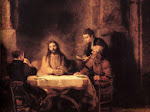My wife asks me from time to time - what about the Feminine Divine? To her it seems unfair that  God is portrayed as strictly male. I somewhat agree - to some degree that does seem overly emphasized. However, I think the problem likely involves the limitation of our language. I will try to explain.
God is portrayed as strictly male. I somewhat agree - to some degree that does seem overly emphasized. However, I think the problem likely involves the limitation of our language. I will try to explain.
The Bible always refers to God in the male gender. However, the Bible implies that God has what is sometimes referred to as a female side. I don't mean God is gender neutral. Instead, I more mean that God seems to encompass more than simply being just male or female. For instance, in Genesis 1 the Bible says that God created man in his own image. However, he created both male and female in that image. This implies that there is a female aspect to the image of God, and thus ultimately to God.
encompass more than simply being just male or female. For instance, in Genesis 1 the Bible says that God created man in his own image. However, he created both male and female in that image. This implies that there is a female aspect to the image of God, and thus ultimately to God.
Yet Christians should be cautious here. Many pagan religions have female goddesses, and then the number of goddesses (and gods) tends to abound. Usually those religions basically view the gods as super-humans, so if there are male gods, there are female goddesses. But these gods and goddesses are not only distant from the God of the Bible, they are in a completely different category. They are limited gods, subject to human foibles as well as to the fates, and are the subject of myths. In contrast the God of the Bible is all powerful, perfect, holy, not subject to anything (especially the fates), and is thoroughly historical as opposed to mythical.
those religions basically view the gods as super-humans, so if there are male gods, there are female goddesses. But these gods and goddesses are not only distant from the God of the Bible, they are in a completely different category. They are limited gods, subject to human foibles as well as to the fates, and are the subject of myths. In contrast the God of the Bible is all powerful, perfect, holy, not subject to anything (especially the fates), and is thoroughly historical as opposed to mythical.
However, in the Old Testament, the Hebrew word for Wisdom is Hokmah, female in gender, and Wisdom is thereby cast in the role of a woman. In Proverbs 8, Hokmah is presented as a person
In the New Testament, the Greek word for Wisdom is Sophia, also female in gender. In the New Testament, all aspects of wisdom focus in the person of Jesus. In Christ, all the treasures of wisdom and knowledge are hidden. Colossians 2:2-3. Christ is not only the power of God, he is the Sophia of God. 1 Corr. 1:24. Does this mean Jesus Christ is secretly female? The simple Christian answer usually given is no, he is definitely all-male. However, the real answer is likely more complex, and many people recognize something they want to call the female side of Christ. While many assert he is the perfect role model for a man, the truth is much broader. I tend to believe there is a mystery of the faith here that God does not exactly intend for us to completely understand.
of the faith here that God does not exactly intend for us to completely understand.
There is a strong part of Church history that embraces Hokmah, as well as Sophia, as part of a feminine wisdom tradition. It is likely a reason one of the greatest architectural church buildings was named the Hagia Sophia (Holy Wisdom). Unfortunately, a good part of that tradition has been lost or suppressed, and should be restored to bring a balance. While some of this has been a reaction to feminist theology that sometimes presses for a female goddess, I think Christians should seek out what is good, right, and true in Church history of a feminine wisdom tradition.
